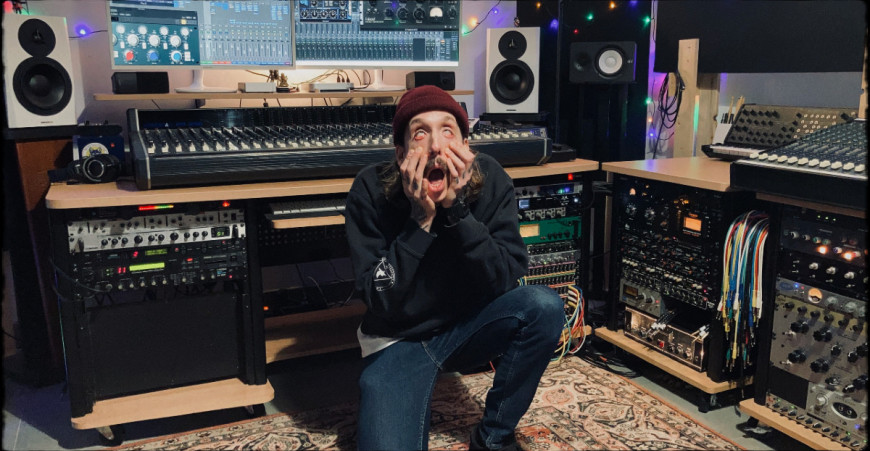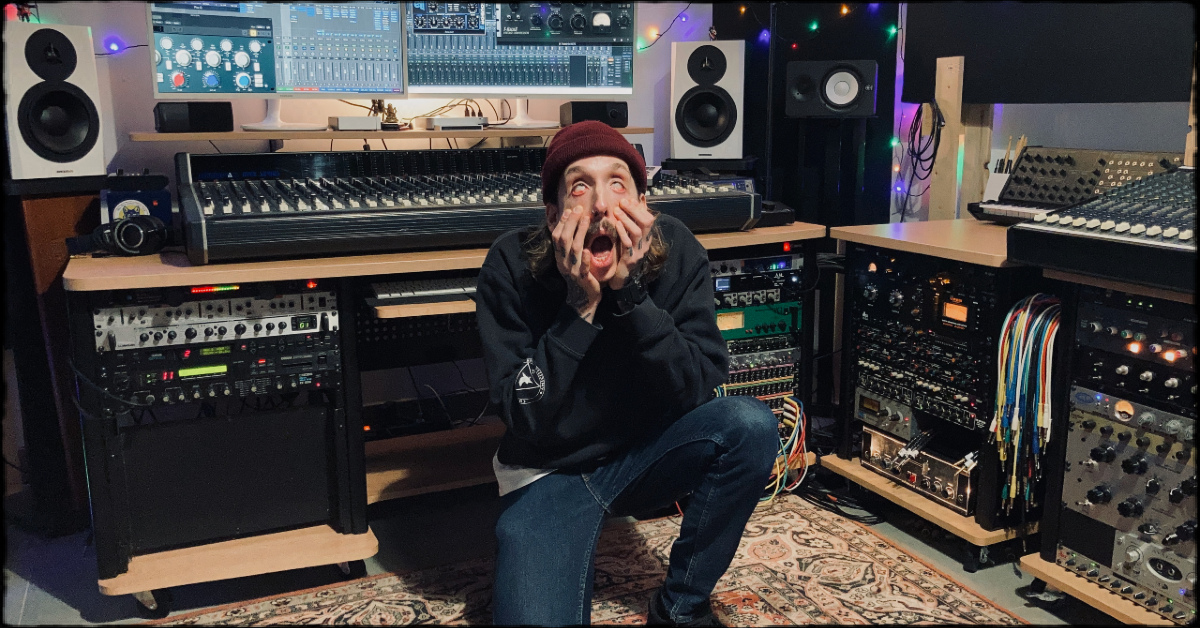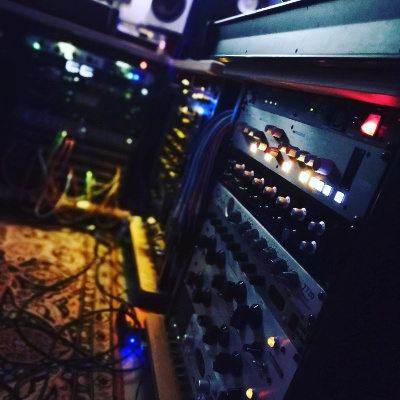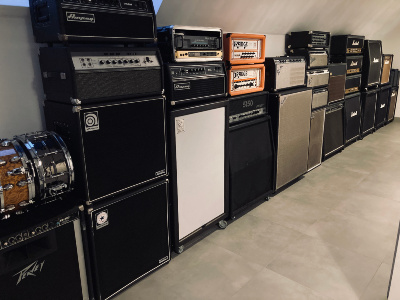Blog search
Artists
- Aara
- Akhlys
- Anfauglir
- Archgoat
- Arkona
- Aversio Humanitatis
- Behexen
- Beneath Moonlight
- Blood Abscission
- Blut Aus Nord
- Bong-Ra
- Cailleach Calling
- Eitrin
- Ershetu
- Godkiller
- I.C.E.
- Inferno
- Insect Ark
- Kaleikr
- Leviathan
- Light Of The Morning Star
- Lychgate
- Martröð
- Miserere Luminis
- Modern Rites
- Mütterlein
- Óreiða
- Other World
- Pestifer
- Pestilength
- Pestilent Hex
- Plebeian Grandstand
- Pure Wrath
- Selbst
- Servants Of Chaos Festival
- Slidhr
- Sühnopfer
- Taubrą
- Terra Tenebrosa
- The Lovecraft Sextet
- Throane
- Ulcerate
- Waidelotte
- White Ward

THROANE – Interview with the producer
 Often working in the background, sometimes even hidden from fans and the press, are sound engineers who have shaped countless metal records and contributed to their success (and sometimes also demise). Playing for Doom/Sludge band AMENRA and being responsible for the production of various avantgarde and progressive records in different genres, Tim De Gieter (Much Luv Studio) from Belgium took on the task of crafting the production for THROANE’s latest EP “Une balle dans le pied”. Our PR man Jonathan talked to Tim about his musical upbringing, his approach to Dehn Sora’s art and why it can be important to not limit oneself to one genre when it comes to listening and producing!
Often working in the background, sometimes even hidden from fans and the press, are sound engineers who have shaped countless metal records and contributed to their success (and sometimes also demise). Playing for Doom/Sludge band AMENRA and being responsible for the production of various avantgarde and progressive records in different genres, Tim De Gieter (Much Luv Studio) from Belgium took on the task of crafting the production for THROANE’s latest EP “Une balle dans le pied”. Our PR man Jonathan talked to Tim about his musical upbringing, his approach to Dehn Sora’s art and why it can be important to not limit oneself to one genre when it comes to listening and producing!
Q: Good day Tim and many thanks for taking the time to answer my questions concerning your work on the latest THROANE EP “Une balle dans le pied”. Let’s start at the beginning: as far as I know you haven’t been working with THROANE for any of its earlier releases. How did you get into contact with Dehn Sora/THROANE concerning the production and mixing of the latest EP? Did you know other musical releases by Dehn Sora or did you even work together with him for one of his other projects?
Hey Jonathan! Thanks for having me, I am more than happy to answer a few questions about this record as I absolutely loved working on it. I met Dehn in 2015 when I was recording “Tri’Muerti”, a collaborative album that had TREHA SEKTORI alongside BARST and RETO MADER. He came down to Belgium to record his parts and I remember we immediately hit it off as he was incredibly talented, easy to work with and we both shared similar interests in music. Over the years we bumped into each other more often when I started playing with AMENRA and now I consider Dehn a close friend. “Une balle dans le pied” was the first release of his I got to work on, though after this I also worked on the TREHA SEKTORI live stream which aired this summer as well.
Q: Can you elaborate for us a bit in detail about how the process of the production and the mixing took place at your Much Luv Studio in Belgium? When you first heard the long song of the EP, what were your feelings and what intuitive thoughts did you have concerning the fitting mix for “Une balle dans le pied”? What made it interesting to mix and produce “Une balle dans le pied”? What inspired you about this release that you wanted to work on it?
I am going to have to be honest and admit that I’m a huge fan of Dehn’s universe, both visually and sonically. Since day one I’ve been eager to work on something together and I already had some type of vision of what sonics I’d personally love to see in THROANE, as a fan. When I first heard the demo of the track I was immediately drawn in by its feeling o f constant threat. Even in the “calmer” parts its grip just doesn’t let go. Dehn sent me the drums, which were recorded at Studio Sainte-Marthe (and already sounded incredible) as well as DI tracks for the guitars and bass and the vocals. Before starting to (re)amp I made a couple of tweaks here and there to the tracks and then went on to look for sounds. I don’t like to rely on mixing as a fixing tool, so I made sure that I took my time selecting amps and pedals. I wanted it to sound like real amps yet retain that “cold” and heavy feel that a lot of industrial music has so I used solid state amp heads, digital reverbs, digital delays etc. When I mix stuff I always start from scratch, I don’t really have any templates or routine. It was pretty close to my birthday and my girlfriend had just given me this amazing fuzz guitar pedal which just looks awesome and has a ton of cool knobs and sliders (Old Blood Noise Endeavours' Alpha Haunt for all the nerds out there) and I remember constantly having it in my hands and just fiddling with it. Because I was so in love with it and it became such a tactile thing for me I just thought “fuck it, I’m going to use this as much as possible on this record”, so the music would become hands-on as well and more interactive. Kind of like a mutual performance. I think I easily spent over 14 hours passing track after track through the pedal, it was lying on my lap and I was turning the knobs as the song progressed, making things very sound very compressed and dense, especially on the drums it responded in a nice way to the tracks. The next day I realized that everything was sounding super fuzzy and some tracks were pretty distorted. I then spent a couple of hours cleaning everything up and for some parts I literally did the volumes of each individual drum hit by hand so that the pedal-sound would work in the mix. That little example sums up the entire mixing/producing experience quite well I think, I was just constantly trying out knobs and effects and even played a sub synth part at the end of the track. I was basically following the track where it was leading me instead of pushing it in a certain direction.
f constant threat. Even in the “calmer” parts its grip just doesn’t let go. Dehn sent me the drums, which were recorded at Studio Sainte-Marthe (and already sounded incredible) as well as DI tracks for the guitars and bass and the vocals. Before starting to (re)amp I made a couple of tweaks here and there to the tracks and then went on to look for sounds. I don’t like to rely on mixing as a fixing tool, so I made sure that I took my time selecting amps and pedals. I wanted it to sound like real amps yet retain that “cold” and heavy feel that a lot of industrial music has so I used solid state amp heads, digital reverbs, digital delays etc. When I mix stuff I always start from scratch, I don’t really have any templates or routine. It was pretty close to my birthday and my girlfriend had just given me this amazing fuzz guitar pedal which just looks awesome and has a ton of cool knobs and sliders (Old Blood Noise Endeavours' Alpha Haunt for all the nerds out there) and I remember constantly having it in my hands and just fiddling with it. Because I was so in love with it and it became such a tactile thing for me I just thought “fuck it, I’m going to use this as much as possible on this record”, so the music would become hands-on as well and more interactive. Kind of like a mutual performance. I think I easily spent over 14 hours passing track after track through the pedal, it was lying on my lap and I was turning the knobs as the song progressed, making things very sound very compressed and dense, especially on the drums it responded in a nice way to the tracks. The next day I realized that everything was sounding super fuzzy and some tracks were pretty distorted. I then spent a couple of hours cleaning everything up and for some parts I literally did the volumes of each individual drum hit by hand so that the pedal-sound would work in the mix. That little example sums up the entire mixing/producing experience quite well I think, I was just constantly trying out knobs and effects and even played a sub synth part at the end of the track. I was basically following the track where it was leading me instead of pushing it in a certain direction.
Q: How does the process continue from the first idea to the final mix, so to speak? Were you often in contact with Dehn Sora and did you discuss various sounds and mixing ideas? How much time did it take you to grant the EP the sound one can hear now in the final release? Did you ever meet personally to discuss the finer elements of the sound et cetera? Additionally: did you also listen to the other outputs of THROANE and Dehn Sora to dig deeper into the sound cosmos of the music?
We tend to chat quite often, when I started the whole process both of us were equally curious and excited to see where this would go. I sent him pictures of the bass and guitar setups when I was tracking, a video of when I was playing the synth bit as well as multiple clips with my iPhone of my mixing-weirdness. Before starting Dehn gave me a couple of pointers, but basically I was free to mix it as I saw fit, which in my humble opinion always leads to the best kind of results because there’s no holding back. I did A-B with “Plus une main à mordre” (the previous record), but only when the mix was at a very advanced stage because I didn’t want to get distracted and only wanted to use referencing as a tool to make sure I was doing something that’d be a cool follow up to that record. After a couple of days working on it, I felt comfortable enough to send a first version of the mix and Dehn seemed really happy with it, requested a couple little tweaks volume wise and that was about it… As I said, I consider myself a fan and him a friend so I was 500% focussed on doing a job that I’d be excited about as a listener and that I’d feel happy to send to someone I deeply care about. I think that kind of atmosphere definitely contributes to the efficiency of the whole process.
Q: The mastering was done by Magnus Lindberg, another rather big name in the scene. Was it necessary to be in contact with him so that the mixing will fit the coming mastering (and the other way around)? Or is such a contact usually not necessary?
I'm pretty picky when it comes down to mastering. It can be a magical final step to getting your mixes from somewhere good to absolutely great, but if you go with the wrong studio it can also become an absolute nightmare and turn the record into something you weren’t planning it to be sonically. I’ve worked with Magnus a couple of times in the past and the results were always great, he seems like a genuinely passionate and friendly guy and to this day I’ve never really had any revision or comment on any of the masters he did for my clients. As I said, I’m a firm believer that the freedom to do as you please (or an absence of restrictions) is the best motivator, so we let Magnus work his magic. To me it’s always extremely weird to be like “Here’s a record that’s not done by this artist, not recorded or mixed by me and mastered by someone else. We’d love for it to sound similar”. That’s like cooking broccoli, handing it to an expert to taste and finish it and saying “I hope it’ll taste a bit like salad because that’s what I like to eat”. You just cooked broccoli. This person’s got taste buds and is an expert in his field. Try to get it to be the best possible broccoli. Then eat it. It’s simple math.
Q: During your musical career you have worked on records of rather different genres – from AMENRA to FÄR and to IF ANYTHING HAPPENS TO THE CAT. In how far is such a versatility helpful when it comes to producing a not so typical record as “Une balle dans le pied”? Do you actually listen to and view albums in the context of a specific genre (for example “a metal album”, “an electronic album”, et cetera) or which elements are you specifically searching for in a record when you start mixing/producing it?
 It definitely is helpful in the sense that most of my “techniques” I use in mixing heavy music (or any style for that matter), especially the more creative side of things, stem from other genres and that translates to what I’d consider “my sound”. Things seem to become pretty standardized really quick sound-wise, in all genres and I feel like drawing inspiration from other genres helps keep things fresh for me. I’d much rather treat my metal bass like I would do an 808 in a hiphop production, stack all these pop-type lush ambience effects on screamed vocals or mix a techno snare as if it were a beatdown break than just be like “well the kick has to be click-y, the snare is a sample, all the guitars need to be bone dry because that’s the way the best sounding records in the genre were made”. Every aspect of music is most fun when it feels like an adventure and you just go along with whatever feels right to you. The record always makes itself. I’m only serving it in all humility and to my best abilities.
It definitely is helpful in the sense that most of my “techniques” I use in mixing heavy music (or any style for that matter), especially the more creative side of things, stem from other genres and that translates to what I’d consider “my sound”. Things seem to become pretty standardized really quick sound-wise, in all genres and I feel like drawing inspiration from other genres helps keep things fresh for me. I’d much rather treat my metal bass like I would do an 808 in a hiphop production, stack all these pop-type lush ambience effects on screamed vocals or mix a techno snare as if it were a beatdown break than just be like “well the kick has to be click-y, the snare is a sample, all the guitars need to be bone dry because that’s the way the best sounding records in the genre were made”. Every aspect of music is most fun when it feels like an adventure and you just go along with whatever feels right to you. The record always makes itself. I’m only serving it in all humility and to my best abilities.
Q: To dig even deeper: could you tell us a bit about your musical education and how you became a sound engineer in the first place? What is your innermost motivation when it comes to producing a record?
My parents enrolled me when I was six into a music initiation course and that kind of set me on the path. I had 7 years of classical piano training, 2 years of acoustic guitar and 2 years of jazz guitar which all led to my very mediocre level as a musician haha. When I was about 13/14 and had completed all of my years of music theory classes I took an optional year that taught arrangement (of classical instruments/music) and for the final 6 months focussed on the process of music recording. That quietly sparked my interest but the idea of ever running a studio seemed out of the question because I lacked both the space as well as the financial means. I started playing in bands by age 15 and I remember we wanted to record a demo and sent an email asking a price quote at a local studio that was very shabby and pretty bare bones equipment-wise (so we assumed it’d be in our very low price range). To our huge surprise the guy asked an amount of money which to this day still seems mind-boggling to me, especially given the nature of the studio. I had saved up about 200 EUR and just said “fuck it I’ll just do it myself”. I spent 150 EUR on two microphones which I still use to this day and a pretty disgusting second hand audio interface. Using a pc which my mom’s work threw away because it functioned poorly and without any technical (or musical, haha) skills whatsoever I recorded an absolute trainwreck. By the time I started university I quickly noticed that I had no interest whatsoever in any kind of desk job or a life that didn’t constantly trigger or excite me. I dropped out twice because I just wanted to stay home and make music instead of having these dusty professors bore me to death. Then I found out about these studies in French which were a lot cheaper than in Dutch (my native language) and which taught you the basics in audio, light, video as well as directing over the course of 3 years. When I got started my sole motivation was that all these skills would be handy for me as a musician and it would grant me another 3 years to be working on stuff I liked without the people around me fearing that my life was going absolutely nowhere. These studies taught me the basics (as well as French, which came in very handy), the 3 years of internships gave me a glimpse of all the aspects of both recording and performing and I had a pretty good idea by then of what I’d want to do. I set out with a slightly better audio interface and a couple more mics and started recording as many bands as I could and re-invested every single euro into more and better gear so I could serve my clients better. Now at 31 I’m still DIY at heart and my focus remains the same, I’m doing this because to me it’s the best thing in the world and I want to help people get the best record I possibly can. Every day I spend mixing or recording I’m still as excited as day one, I keep on learning new things, get to work with amazing artists… What’s not to love?
No products
To be determined Shipping
0,00 € Total